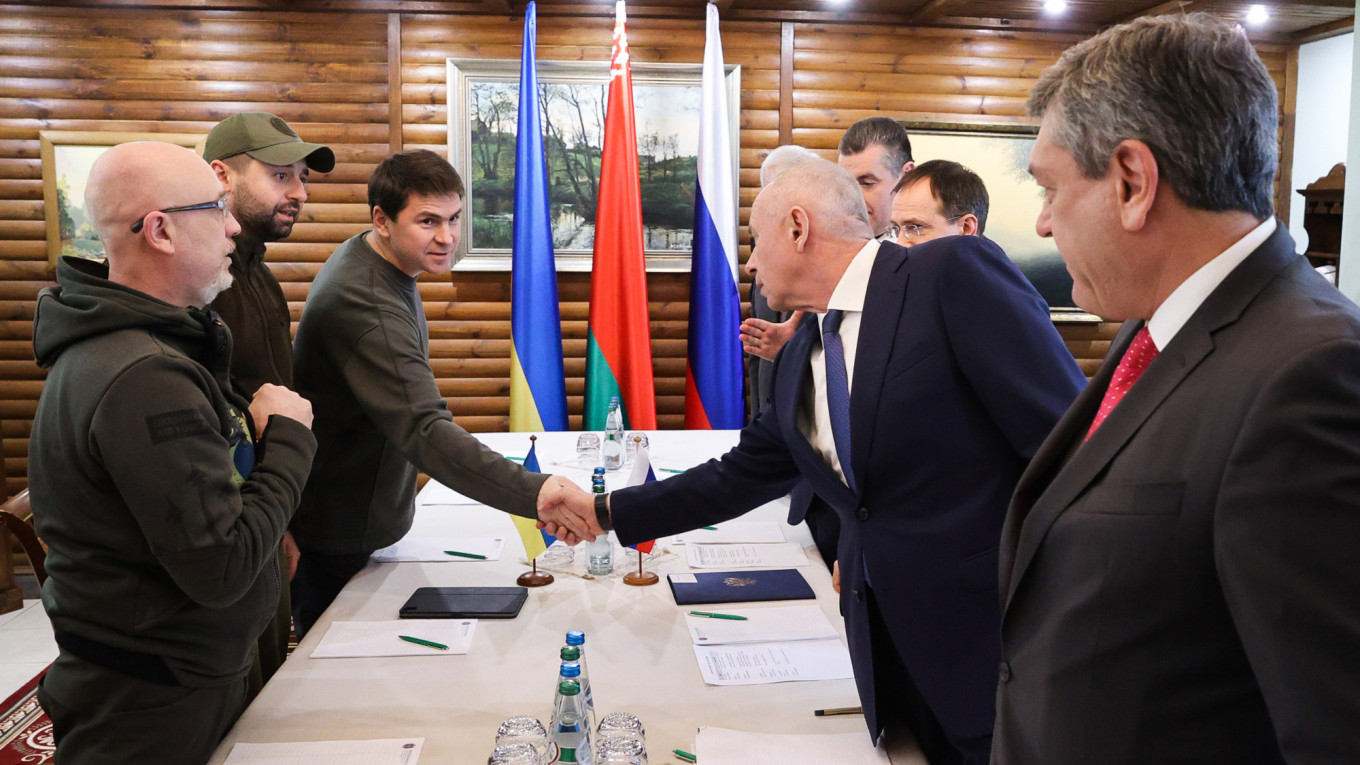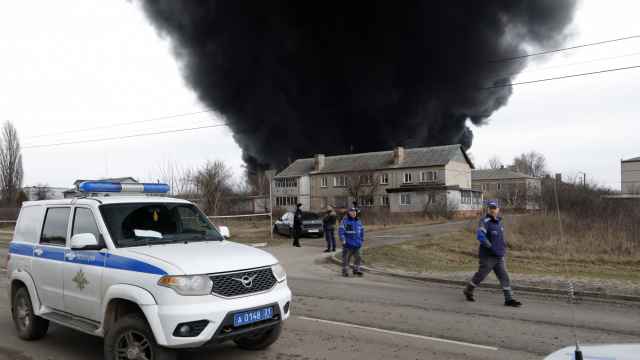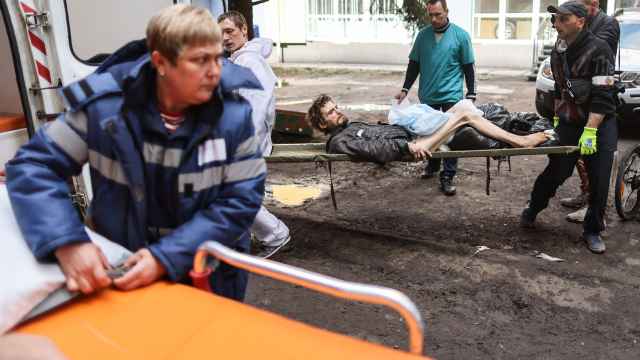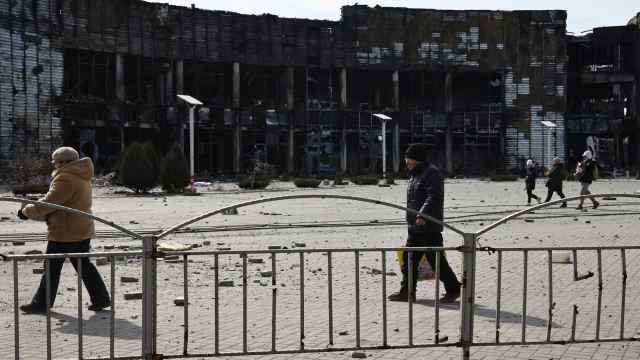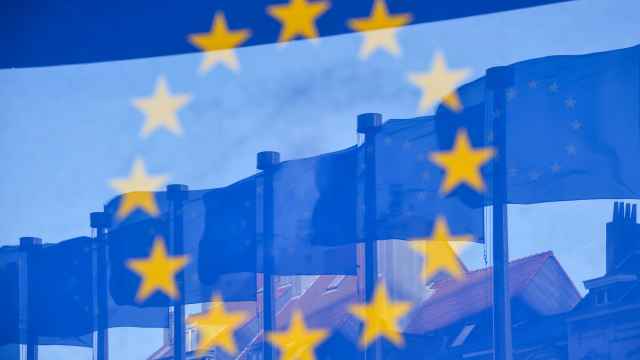Russia and Ukraine will restart face-to-face peace negotiations on Monday, amid warnings that the situation in the besieged city of Mariupol was now "catastrophic."
President Volodymyr Zelensky hailed the resumption of over-the-table talks, saying they must bring peace "without delay" and signaling a willingness to compromise on the most sensitive topics.
The two sides have not met in person in weeks, but will hold three days of talks in Istanbul from Monday, according to David Arakhamia, a Ukrainian negotiator, lawmaker, and Zelensky ally.
Several rounds of talks have already failed to end the war sparked by the Russian invasion, which is now in its second month.
About 20,000 people have been killed, according to Zelensky, 10 million have fled their homes and despite Russian military setbacks, several cities are still coming under withering bombardment.
In the southern port city of Mariupol, about 170,000 civilians are encircled by Russian forces, with ever-dwindling supplies of food, water, and medicine.
Ukraine's foreign ministry said the situation there was "catastrophic" and the assault from land, sea, and air had turned the once-thriving city of 450,000 people "into dust."
France, Greece, and Turkey are hoping to launch a mass evacuation of civilians within days, according to French President Emmanuel Macron, who has sought an agreement from Russian counterpart Vladimir Putin.
Return to the table
With Russia's much-larger military hampered and humbled by fierce Ukrainian resistance, the Istanbul talks will test whether battlefield setbacks have tempered Moscow's demands.
Moscow was recently forced to abandon its efforts to capture Kyiv, and – according to senior Russian general Sergei Rudskoi – focus on the "main goal" of controlling the eastern Donbas region.
The fate of Russian-occupied Donbas and Crimea, as well as fundamental disagreements about Kyiv's alignment with the West, are again set to be the focus of negotiations.
"Our goal is obvious – peace and the restoration of normal life in our native state as soon as possible," Zelensky said in a late-night video message that also set out his negotiating red lines.
"Ukraine's sovereignty and territorial integrity are beyond doubt. Effective security guarantees for our state are mandatory," he said.
Zelensky had previously indicated he is "carefully" considering a Russian demand of Ukrainian "neutrality" and indicated he was willing to negotiate the future of Donbas at a later date.
"We understand that it is impossible to liberate all territory by force, that would mean World War III, I fully understand and realize that," he said.
For his part, Putin has avoided clearly defining the goals of his invasion, stating only that he wants to "demilitarise and denazify" but not occupy Ukraine.
Commentators hope that vagueness will now give him more room to accept an agreement, claim victory and end the war.
Spanner in the works?
It remains to be seen whether talks will be hampered by U.S. President Joe Biden's shock declaration that Putin "cannot remain in power."
The ad-libbed remark sparked outrage in Moscow and seemed to undercut Biden's own efforts for the West to present a united front.
Asked by reporters Sunday if he had been calling for regime change, Biden responded: "No." German Chancellor Olaf Scholz also told media that was "not the objective of NATO, nor that of the U.S. president."
Macron warned that any escalation "in words or action" could harm his efforts in talks with Putin to agree on evacuating civilians from Mariupol.
Neither intense diplomacy nor steadily mounting sanctions have persuaded Putin to halt the war.
Divided nation
Many in Ukraine remain suspicious that Moscow could use the talks as an opportunity to regroup and fix serious tactical and logistical problems in the Russian military.
Ukrainian intelligence chief Kyrylo Budanov said Putin could still be aiming to divide the country in a Korea-like fashion -- to "impose a separation line between the occupied and unoccupied regions".
"After a failure to capture Kyiv and remove Ukraine's government, Putin is changing his main operational directions. These are south and east," he wrote on Facebook. "It will be an attempt to set up South and North Koreas in Ukraine."
Russia has de facto control over the southern region of Crimea and the self-proclaimed Donetsk and Lugansk republics in the country's eastern Donbas region.
The head of Ukraine's Lugansk separatist region has indicated it may hold a referendum on becoming part of Russia.
Resistance in besieged Mariupol is the main obstacle preventing Moscow from gaining unbroken control of land from the Donbas to the Crimea.
Counterattacks
But it is clear Russia's original hopes of sweeping across Ukraine undeterred have faded.
Russian forces have made little progress in capturing key cities, prompting a shift to aerial bombardment of civilians.
With Western-supplied weapons, Ukraine's fighters continue to hold off – or even push back – the Russian army.
In the southern town of Mykolaiv, under heavy assault for weeks, the bombardments appeared to be easing.
That was a welcome respite for locals like young Sofia, who suffered head injuries during shelling in early March near Mykolaiv.
"Now I can move my arms and legs a little. I still can't get up without my mother's help, but hopefully, I can leave soon," she told AFP.
The frontlines appeared to have receded from Mykolaiv, with a counteroffensive being mounted in Kherson, about 80 kilometers to the southeast.
Recent shelling killed two people in a village near Kherson, the only significant city the Russian army claims to have seized.
In Kherson itself, about 500 people took part in anti-Russian demonstrations on Sunday.
Kyrylo, a paramedic who spoke with AFP by telephone, said Russians dispersed the peaceful rally with tear gas and stun grenades.
The Ukrainian defense ministry said its forces had also recaptured Trostianets, a town near the Russian border.
It released images showing Ukrainian soldiers and civilians among heavily damaged buildings and what appeared to be abandoned Russian military equipment.
A Message from The Moscow Times:
Dear readers,
We are facing unprecedented challenges. Russia's Prosecutor General's Office has designated The Moscow Times as an "undesirable" organization, criminalizing our work and putting our staff at risk of prosecution. This follows our earlier unjust labeling as a "foreign agent."
These actions are direct attempts to silence independent journalism in Russia. The authorities claim our work "discredits the decisions of the Russian leadership." We see things differently: we strive to provide accurate, unbiased reporting on Russia.
We, the journalists of The Moscow Times, refuse to be silenced. But to continue our work, we need your help.
Your support, no matter how small, makes a world of difference. If you can, please support us monthly starting from just $2. It's quick to set up, and every contribution makes a significant impact.
By supporting The Moscow Times, you're defending open, independent journalism in the face of repression. Thank you for standing with us.
Remind me later.


